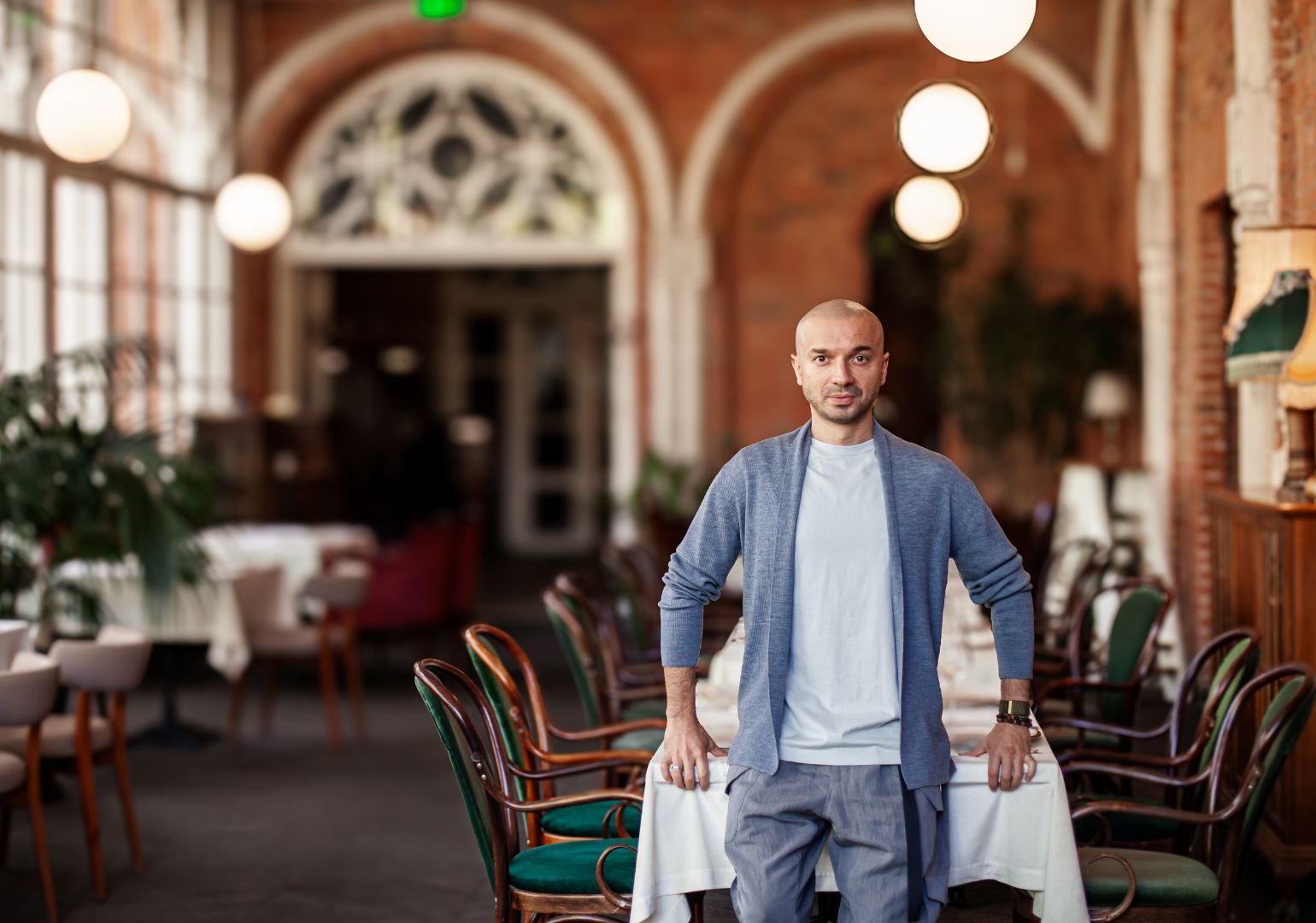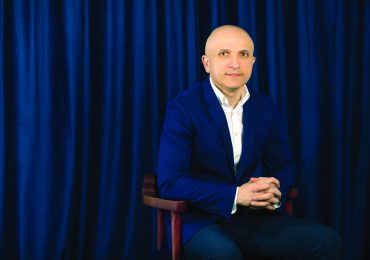“Guliani Group” was founded in 2011 with the first restaurant opened by Gurami Oniani in emigration. Today, the network includes more than 30 objects in Tbilisi and Moscow. This number does not satisfy the founder of “Guliani Group” and in order to increase the awareness of Georgian cuisine in the world, he is going to expand his business even more – and the main plan is to open the first Georgian restaurant of the chain in the USA. Gurami Oniani spoke to Forbes Georgia about the first steps in the restaurant business, the company’s achievements and plans.
How did you get into the restaurant business?
I think, subconsciously, everything comes from grandma Lali. She is a housewife from Racha, who used to bake excellent pasty with beans and cheese (khachapuri) when I was a child. In general, cooking, and especially baking, has always had an important place in our family. I think that played a big role in my getting into this field.
After my childhood, I lived mostly in emigration. I entered the Moscow Institute of International Relations at the faculty of International Law, and I defended my master’s degree in London. During this period, my father had several restaurants as a hobby. I was also always saying that I saw myself in this business. However, when I finally decided to leave my professional job in an American company and open a restaurant, my family members did not take it too well at first. I think the reason was that the mentioned activity did not use to be taken seriously at that time.
So in 2011 I opened my first Georgian restaurant in Moscow, “Khinkali House”. Since entering the restaurant business, the main driving force has been to do something unconventional.
What was this non-standard thing?
For example, at that time, the interior of Georgian restaurants was mostly dark and heavy, overloaded with combat themes, which made the environment even heavier. I decided that my restaurant should have a European interior and offer Georgian cuisine to the guests in this environment.
What challenges did you face when entering the restaurant business?
The main challenge was the shortage of cooks, especially for Georgian cuisine. At that time, the concept of chef existed in Georgian cuisine, although he performed a different job functionally. Back then, a chef was a person who simply prepared delicious meals and was, so to speak, the main person in the kitchen. Nobody actually knew the administrative side of kitchen management, therefore economic details remained out of focus. We tried to correct this deficiency and give them relevant knowledge.
The second problem was to attract people from Georgia and employ them legally, with the appropriate documents. If you were lucky, you would have found an employee on the spot who already had documents.
At the beginning of the conversation, we mentioned doing things in a non-standard way – what changes have you introduced in Georgian cuisine?
I think that the biggest and most important innovation we brought to Georgian cuisine was offering it in the form of fast food. It all started with the fact that in 2013 we opened a Georgian fast-food restaurant in one of Moscow’s shopping centers, on the food court, next to KFC and McDonald’s.
Back then, it was incredible how you could eat khinkali in the form of fast food. The main challenge was to deliver the product quickly to the customers. Georgian dishes traditionally take 20 to 40 minutes to prepare, we had to do it all in two minutes.
Shortly after the opening of the facility, we became the top five in terms of sales among about 30 food brands represented at the food court. It should be noted that McDonald’s, KFC, Burger King and others were among these brands.
I consider this to be our main achievement, since it was the introduction and development of the fast food format in Georgian cuisine.
In addition, we have established the second format – “Ready to go”, which is more specific. There are culinary counters where the entire kitchen is presented. All the offered dishes are prepared on the spot, in front of the customers.
In addition, shortly before the pandemic, in 2018, “TSOMI” appeared, which mainly features four dishes, including a doughless version of Adjarian khachapuri and cream doughnuts. This establishment was based on a more fast-casual concept, which means a dining style offering quick service and higher quality food than traditional fast food.
What other types of restaurants does the Guliani Group include?
We have traditional Georgian cuisine, family restaurants, which are called “Ojakhuri”, as well as modern Georgian cuisine in Tbilisi, “Shushabandi”, where there are Georgian traditional and slightly more modern dishes.
In addition, the network includes gastrobars called “Megobari”, where the emphasis is also on slightly more modern cuisine and Georgian wine, which we have a wide selection of. Also, we have a slightly different format of fast food establishments. We also own Asian and Italian cuisine restaurants in Georgia.
Would you single out any project in particular?
When you’re involved in a project from the very beginning, especially when it’s a new concept, it’s hard to prioritize any of them. In our company, many brands are already a network – several objects are united in one brand. There are stand alone project, such as “Shushabandi”. I was involved in each project from the idea level, I also participate directly in the concept part. Therefore, it is difficult for me to single out any of them in particular.
However, I would still choose the fast-food direction, because we, one might say, were the first in Georgian cuisine. Even today, we are seriously working on improving this format, since we still see the perspective mainly in this direction.
How are you trying to refine the format?
Until now, the preparation of meals in fast food establishments was carried out entirely in the mentioned space, for which a lot of people worked there. The customer could watch every step of the cooking process, which is great to see itself, but it creates some problems too. It may not be a large restaurant, but it requires as much human resources as it it is necessary in its case.
When you think about large scale, it’s difficult to develop like that, that’s why we opened a production facility where many things will be made to some stage, distributed on demand on the network and finished there. This means the need for less professional staff on site.
It is true that the Georgian kitchen cannot be turned into a McDonald’s, but the processes can be accelerated and simplified.
Let’s talk about expansion. Apart from Tbilisi, are you planning to open restaurants in the regions of Georgia?
There is quite a large demand in different regions of the country, especially in Adjara, Batumi. We are already considering several projects. However, our main direction is still to expand beyond borders.
Then I ask you this question – what are your plans for overseas expansion?
During my stay in emigration, I actively thought about the importance of increasing the awareness of Georgia. The reason for this was that almost no one around me knew anything about Georgian culture, cuisine, wine or other details about Georgia.
When I got deeper into this business, at some stage I realized that I was engaged in something that can increase the awareness and popularity of Georgia in the world. I think Georgian cuisine can be a kind of ambassador of Georgia abroad.
Our plans also serve this purpose – Guliani Group is starting to develop in the USA. In New York, we have already taken a place in Manhattan, where renovation works are going on. In just a few months, we hope to open our first restaurant in the US. We have big plans for expansion, but the concept will still need to be approved locally. This will be a version of a modern Georgian bistro, where visitors will be able to try Georgian cuisine and Georgian wine. We will offer them breakfast, lunch and dinner.
Finally, please tell us about your long-term plans – if you plan to open restaurants in other countries of the world.
Yes, of course. The goal of our company is to make as many countries as possible fall in love with Georgia, and for this we have a great tool in our hands – Georgian cuisine.
S
Forbes Georgia: სარედაქციო გუნდი


















